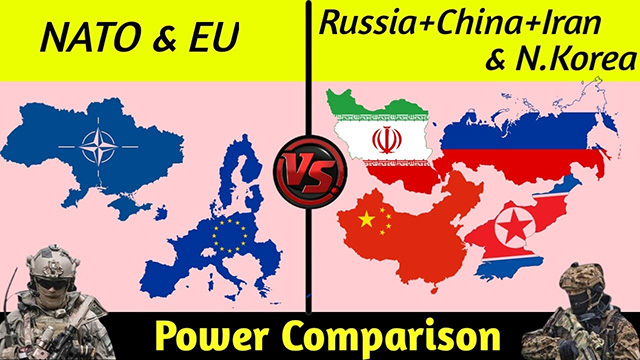
The danger of basing U.S. foreign policy on imaginary things should be obvious, writes ‘The Responsible Statecraft’. Lumping US adversaries into a single-headed monster is a paranoid delusion used as to fuel militarism.
The head of Indo-Pacific Command, Admiral John Aquilino, recently warned members of the House Armed Services Committee about increasing cooperation among Russia, China, Iran, and North Korea.
While it is true that there has been some increased cooperation between these four governments, it is dangerous and misleading to suggest that they form anything resembling a close alliance or coalition. If the U.S. were to “act accordingly,” as Adm. Aquilino recommended, it would risk driving these states much closer together and creating the very axis that U.S. officials fear.
Aquilino’s phrasing is revealing. When he said, “We’re almost back to the axis of evil,” that seems to suggest that he thinks there was a real one that serves as a model for the current group. The first “axis of evil” that George W. Bush denounced in his 2002 State of the Union address was made up of three states — Iran, Iraq, and North Korea — that were united only by Washington’s hostility to them. Iran and Iraq had long been enemies and remained so at the time, and North Korea was added to the mix so that it wouldn’t be entirely fixated on predominantly Muslim countries. These states weren’t working together, and two of them were opposed to each other.
There was no axis then, and there still isn’t one now. The purpose in tying together unrelated adversaries has always been to exaggerate the size of the threat to the United States to scare policymakers and the public into supporting more military spending and more overseas conflicts. If inflating the threat from any one adversary isn’t enough to instill sufficient fear, the invention of an axis that includes some or all adversaries around the globe can be very useful to hawks. Because it automatically calls to mind World War II and the fight against the Axis Powers, it also helps them to demonize the other states and smother domestic dissent. Supporters of hawkish policies in each region will then have an incentive to embrace the axis rhetoric and reinforce these views among their political allies.
The more that officials in Washington see these states as a hostile coalition, the less inclined they will be to negotiate with any of them for fear of signaling “weakness” to the rest.
To the extent that these four states are working more closely than they have in the past, aggressive U.S. policies have encouraged that collaboration. The U.S. pursuit of dominance in every region creates incentives for regional powers to assist each other, and Washington’s frequent use of sanctions to punish all these states gives them another reason to help each other evade sanctions.
read more in our Telegram-channel https://t.me/The_International_Affairs

 11:56 26.03.2024 •
11:56 26.03.2024 •






















